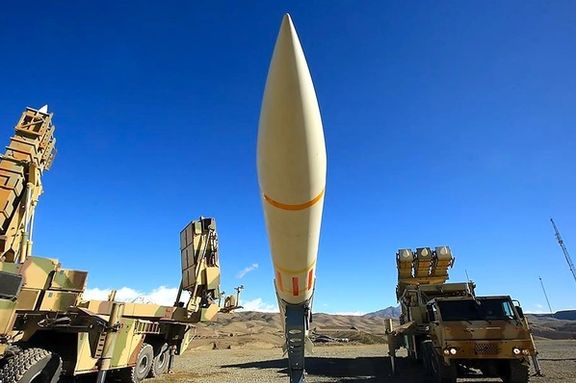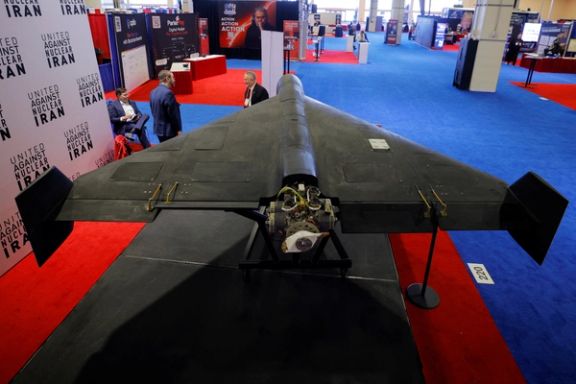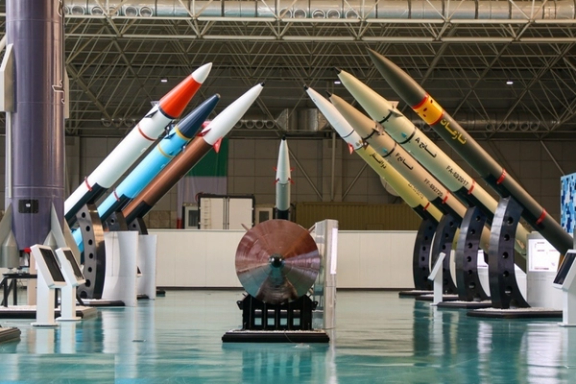Iran nuclear sites on high alert amid attack fears - Telegraph

Iran has placed its nuclear sites on high alert, deploying additional defenses amid escalating fears of a joint Israeli-US attack, The Telegraph reported on Tuesday.

Iran has placed its nuclear sites on high alert, deploying additional defenses amid escalating fears of a joint Israeli-US attack, The Telegraph reported on Tuesday.
Citing two unnamed government sources, the outlet said the Islamic Republic has also been bolstering defenses around key nuclear and missile sites, which include the deployment of additional air defense system launchers.
According to the sources, the measures are in response to growing concerns of potential joint military action by Israel and the United States.
“They [Iranian authorities] are just waiting for the attack and are anticipating it every night and everything has been on high alert – even in sites that no one knows about,” one source said.
“Work to fortify nuclear sites has been ongoing for years but it has intensified over the past year, particularly since Israel launched the first attack,” he added referring to Israel’s October attack that damaged Iran's air defense systems.
“Recent developments, including Donald Trump’s comments and reports about potential plans from his administration to strike Iran, have further intensified activities.”
The report follows warnings from US intelligence to both the Biden and Trump administrations that Israel would likely target key Iranian nuclear sites this year.
In February, the Wall Street Journal and The Washington Post cited US intelligence findings from January suggesting that Israel saw an opening for an attack on Iranian nuclear sites as early as the first half of this year.

Poland helped put an Iranian Shahed-136 drone on display in Washington and the United Nations to expose Tehran's destabilizing activities, Polish Foreign Minister Radek Sikorski told Iran International, dismissing the Islamic Republic's objections.
"The first credit for bringing this evidence here goes to the brave soldiers of Ukraine, who shot down this missile," Sikorski said, standing next to the drone on the sidelines of a UN Security Council meeting on Ukraine.
Iran’s foreign ministry on Monday said it has summoned Poland’s chargé d'affaires in Tehran following Sikorski's criticism of Iran and Russia's military cooperation amid the latter's full-scale invasion of Ukraine.
Semi-official IMNA news agency reported that the summons followed Sikorski’s role in facilitating the transfer of an Iranian-made drone from Ukraine to the US for display at the Conservative Political Action Conference (CPAC).
"We just helped Ukraine to get it out of Ukraine and to bring it here, for the world to see that Iran is still exporting its destabilization, it's trying to export its ideology," Sikorski added.
Despite evidence to the contrary, Tehran has repeatedly denied its provision of drones to Russia for its war on Ukraine, which has seen Iran levied with heavy sanctions from countries such as the UK, US and EU.
Following the exhibition, Iran’s Mission in the United Nations said, “There is no legal prohibition on its sale.”
Addressing Iranian authorities, Sikorski added, "This is a warning. We know what you're doing. It is cruel against the principles of the UN Charter.
"Stop doing it now."
Sikorski made the remarks during an exhibition organized by United Against Nuclear Iran (UANI). UANI first unveiled the drone during the CPAC meeting last week.
"Many, many hundreds of people have already died from the use of this imprecise, indiscriminate weapon. We believe over 7,000 have already been launched against Ukraine," Sikorski said.
According to the Wall Street Journal, the Shahed-136 drone is considered the most widely used military drone in the world, manufactured in Iran's military industries under the supervision of the IRGC, which designated as a terrorist organization by the United States.
Russian forces have used thousands of these drones—rebranded as Geran-2—in Ukraine, with one striking Chernobyl’s radiation containment shelter earlier this month.
Iranian-backed militants also launched a Shahed that killed three US service members in Jordan in January.
UANI CEO Mark D. Wallace unveiled the Shahed-136 drone alongside CPAC Chairman Matt Schlapp.
Speaking to Iran International, Wallace described the drone as "the most ubiquitous WMD terror weapon of our time," citing its extensive use across the Middle East.
"This system has been fired at and killed American troops and service members across the Middle East," Wallace said. "It's been fired on Israel from Iran. It's been fired against Saudi Arabia's oil facilities. It's been fired against the Arab Emirates, including the iconic skyscraper, the Burj Khalifa."
The United States first warned in July 2022 that Iran was preparing to supply Russia with battlefield drones, and September 13 marked the anniversary of the first Shahed drone being shot down by Ukraine.
Russia soon began large scale use of the Iranian drones in attacks on Ukraine’s infrastructure and civilian targets. The Shahed 136 drones have been used alongside cruise and ballistic missile attacks to overwhelm Ukrainian air defenses.
‘CPAC for Iranians in Exile’
Following the drone unveiling, CPAC and UANI announced the formation of "CPAC for Iranians in Exile," a platform designed to unite the Iranian diaspora against the Islamic Republic.
Wallace emphasized the need for unity, saying, "The civil and collegial discussion amongst Iranian diaspora members of diverse views, backgrounds and heritage is the Ayatollah’s greatest fear."
According to UANI, the group aims to provide a space for dialogue and engagement with US policymakers, focusing on ending the "Ayatollah's despotic rule."
Wallace expressed hope that the event would mark "the beginning of a new era" for the Iranian diaspora, fostering unity and cooperation in their fight for a free and democratic Iran.

Iran's highest-ranking military officer has publicly advocated for privatization as the nation faces chronic energy shortages and rampant inflation.
“The model for the country's salvation is to turn to the people. If we want to solve the economy, the solution is to turn to the private sector and entrust work to the people," Major General Mohammad Bagheri said.
Iran's armed forces, the Islamic Revolution Guard Corps (IRGC) in particular, have benefited from previous waves of privatisation, taking over fully or in part the companies and businesses that the government puts up for sale.
Bagheri's call comes amid reports that the Iranian Armed Forces, including the IRGC, will receive a substantial 51% (approximately €12 billion) of the government's €24 billion oil and gas export revenues in the upcoming budget.
The budget bill for the next Iranian year (starting March 21) details that while 37.5% of oil and gas revenue goes to the government, over half of that portion funds the military.
Last year, a Reuters report indicated that the IRGC already controls up to half of Iran's oil exports, funding military operations and allies.
Recent Central Bank statistics also show a significant decline in private sector involvement in foreign trade, replaced by government entities that receive the majority of foreign currency.
Customs data further shows that government-controlled petrochemical, steel, oil, and gas products dominate exports.
The country’s new budget allows the Oil Ministry to contract with third parties for oil and gas field operations to settle debts, raising fears that these contracts will fall into the hands of the so-called "Khosoulati" entities—quasi-state organizations controlled by insiders of the ruling system, rather than genuine private sector businesses.
HamMihan newspaper warned last year that such a policy risks transferring national resources to entities lacking the necessary capacity and resources, further entrenching government-linked organizations in the economy.

Some Iranian politicians maintain that Tehran’s military strength is deterring the United States as tensions fester between President Donald Trump and the Islamic Republic.
Former parliament member Ezzatollah Yousefian said on Friday that “Trump does not want to go to war with Iran because he knows Iran’s missile power can obliterate an entire country.”
Yousefian also reiterated that Iran will not accept to take part in any negotiation in a situation marked by arrogance.
Another former lawmaker, Mohammad Hassan Asafari, told a local conservative website, “Trump has realized that Iran is now speaking with one voice and that no one in Iran will accept negotiations under threats and arrogance.” He added that Trump’s decisions on Iran are influenced by the latest developments in Iran’s domestic political climate.
Despite Asafari’s claim of unity, many political figures in Tehran have been asking for a change in foreign policy and negotiations with the United States.
Asafari also urged Tehran to stand firm against Trump, saying, “Trump is accustomed to using fear and intimidation in negotiations, but Iran is aware of his tactics and will not bow to arrogance or threats.”
Addressing Trump’s statement about allowing Israel to attack Iran if Tehran refuses to negotiate over its nuclear program, Asafari said, “If we stand firm, Trump will back down, but if we show division, he will exploit it.” He also echoed Yousefian’s statement that Iran’s missile power is substantial, adding, “If Israel makes a miscalculation, confronting Iran will not be easy.”
Iran launched hundreds of ballistic missiles against Israel twice in 2024, causing minimal damage as most were intercepted by Israeli, US and other allied air defenses and warplanes.
Yousefian also noted that “Trump constantly contradicts himself to confuse his opponents, which reflects a businessman’s mentality.” He added, “He is committed to protecting Israel, but no one can predict the tactics he will use to achieve that.”
Trump’s objective goes beyond preventing Iran from obtaining nuclear weapons; he aims to disarm the country entirely, Yousefian argued. He explained that Trump is increasing pressure on Tehran to force it to the negotiating table, adding, “Unlike Biden, Trump is not a patient man and will not spend two years on negotiations. He wants quick results; otherwise, he will exert more pressure.”
In another development, Iran's Deputy Foreign Minister Majid Takht Ravanchi emphasized that the Foreign Ministry “will act within the frameworks set by Supreme Leader Ali Khamenei for interaction with America.” He deliberately used the term “interaction” instead of “negotiation,” reflecting Khamenei’s firm opposition to talks with the United States.
During an interview with an Iraqi network on a recent visit to Baghdad, Ravanchi criticized the US for failing to uphold its commitments under the 2015 nuclear deal with Iran. He noted that Trump withdrew from the agreement in 2018 after Iran declined to engage in new talks on its nuclear program and regional military ambitions. Ravanchi added that Iran is now focused on pursuing discussions with Europe.
In another development, prominent Iranian lawmaker Ali Keshvari criticized the United States, saying, “The US has a poor track record in its previous negotiations with Iran,” and accused it of “easily undermining its obligations.”
Keshvari also accused the US of “unilateralism when dealing with independent countries,” arguing that “the US seeks only to serve its own interests and secure concessions without offering any in return.” He added, “The US has employed this approach in its negotiations with many other countries,” although he did not specify which ones.

Israeli fighter jets on Sunday buzzed over the funeral ceremony in Beirut of slain Hezbollah leader Hassan Nasrallah, in what the visiting Iranian foreign minister called a violation of Lebanon’s sovereignty and an attempt to intimidate mourners.
"I witnessed, with my own eyes, the violation of Lebanon's sovereignty by Israeli jets that flew close above our heads, in a pitiful attempt to terrify people who gathered only to mourn," said Foreign Minister Abbas Araghchi who was in Beirut to attend Nasrallah's funeral.
"If that is not an act of terror, then what is?" he asked in a post on his X account, in which he also embedded a video of the Israeli jet fighters flying low over the Lebanese capital.
The Israeli defense minister confirmed his country's aircraft flying over the funeral of Nasrallah, saying that the move "conveyed a clear message: Those who threaten to destroy Israel and attack Israel, it will be their end."
“You will specialize in funerals, and we will in victories,” Israel Katz said in a statement.
As the funeral was under way in Beirut, the Israeli military released videos of the moment it assassinated Nasrallah on September 27, 2024, along with several other commanders of the Iran-backed group, in an attack on their underground headquarters in Beirut.
Hezbollah, designated a terrorist organization by countries such as the US and UK, is currently in a fragile US-French brokered ceasefire with Israel, while both sides allege continued violations.
Although Israel's military has mostly pulled back from southern Lebanon, its air force continues to target what it claims are Hezbollah positions throughout the country, while its troops still maintain control over five hilltop positions along the border.

Hezbollah Secretary-General Naim Qassem on Sunday reaffirmed the group’s allegiance to Iran’s leadership, in a video broadcast during the funeral of the group's assassinated leader Hassan Nasrallah.
“We are the children of Khomeini and Khamenei,” Qassem said in a video message saying the group's struggle is guided by the ideology of Ruhollah Khomeini, the founder of the Islamic Republic, and Supreme Leader Ali Khamenei.
In the video broadcast aired during the funeral of Hezbollah leader Hassan Nasrallah and his deputy Hashem Safieddine in Beirut, both killed by Israel, he also vowed that the Iran-backed militant group would not abandon its fight.
“We will not abandon the resistance, even if our homes collapse on our heads," he said, after the group suffered its worst losses in its history last year.
Israel eliminated hundreds of the group's militants and the top echelons of its leadership, all the way to the long-time leader, Nasrallah.
Israel also destroyed swathes of the group's infrastructure during a wave of targeted strikes before the current ceasefire began in November.
Iran’s Supreme Leader Ali Khamenei also issued a message for Nasrallah’s funeral, honoring him as a pioneering leader of the resistance whose legacy will endure.
Khamenei also praised Safieddine as a vital figure in Lebanon’s resistance, offering prayers for them and all the group's fallen fighters.
“The resistance against usurpation and oppression will continue until its goals are achieved," he added.